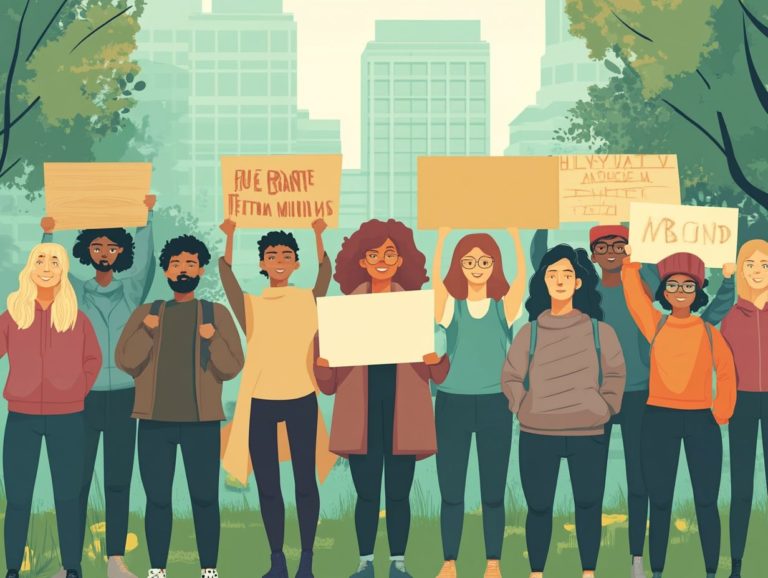The Right to Appeal: A Guide
The right to appeal stands as a cornerstone of fairness and justice in both legal and administrative processes.
This article delves into its significance, illustrating how it acts as a vital safeguard against errors and injustices. It provides a comprehensive, step-by-step outline of the appeals process. You will learn about common grounds for appeal and receive valuable tips on how to prepare and present a compelling case.
It also gives you insights into what to expect after an appeal, empowering you with the knowledge necessary to navigate this essential legal right with confidence.
Contents
Key Takeaways:

The right to appeal is crucial as it allows individuals to challenge unfair or incorrect decisions made by authorities.
Understanding the grounds for appeal and preparing a strong case with evidence can increase the chances of a successful outcome.
Effective presentation techniques and being aware of possible outcomes can greatly impact the results of an appeal process.
The Importance of the Right to Appeal
The right to appeal is a key part of the judicial system. It emphasizes the importance of allowing every defendant the opportunity to seek a review of their case after a trial court’s ruling.
This legal recourse acts as a vital safeguard against potential errors that could have swayed the verdict. It upholds the constitutional rights of individuals in various jurisdictions, including circuit and appellate courts.
The appellate process offers a structured avenue for challenging judgments. This ultimately strengthens the integrity of the judicial system and the legal principles it embodies.
Understanding the Purpose and Benefits
Understanding the purpose and benefits of the appeal process is essential as you navigate the complexities of the judicial system, especially in courts that review decisions made by lower courts.
This process is not just a mechanism to correct legal errors; it ensures that everyone receives the fair trial they are entitled to by law.
When you appeal a conviction, it opens the door for a higher court to scrutinize the legal standards applied. This can significantly sway judgments and outcomes.
The appeal process fosters transparency within the legal system. It provides the public with valuable insights into judicial practices and reinforces trust in the rule of law.
Ultimately, it serves as a critical safeguard against miscarriages of justice. It allows for a thorough review of decisions that profoundly affect the lives of defendants like you.
The Appeals Process
The appeals process presents a well-defined sequence of steps that give you the power to contest a lower court’s judgment. You have the power to challenge a decision that feels wrong. Let s explore how to make your case strong!
This approach helps review your case thoroughly. It also highlights the need for precision and care in preparing all essential documents, including the case record and filing materials.
Step-by-Step Guide
A step-by-step guide through the appeals process requires you to understand the preparation of briefs, the formulation of legal arguments, and the potential for an oral argument before a three-judge panel.
Navigating each stage demands careful attention to detail and a solid grasp of legal principles. When preparing a brief, you must dive into thorough research to gather relevant case law and statutory references that bolster your position.
Once that groundwork is laid, crafting compelling legal arguments becomes essential. These arguments will form the foundation of your case presented to the appellate court.
Oral arguments present a unique opportunity to clarify your positions directly to the judges. This fosters dynamic interaction and allows for immediate questions.
The three-judge panel, responsible for evaluating the merits of your case, plays a crucial role in deliberations. Their collective insights can significantly sway the final ruling, underscoring the importance of presenting a well-structured case at every stage.
Ready to understand your right to appeal? Let’s dive in!
Grounds for Appeal

Grounds for appeal include various legal mistakes that could have influenced the conviction during trial proceedings. These may involve violations of sentencing guidelines, improper admission of evidence, and procedural missteps that warrant careful judicial review.
Common Reasons to Appeal a Decision
- Judicial errors
- Violations of constitutional rights
- Deviations from established legal standards
- Wrongful application of habeas corpus, which allows a person to challenge their detention
You might find yourself appealing when a judge misinterprets specific statutes, leading to an unjust outcome.
Procedural missteps, such as lacking representation during critical hearings, can also necessitate a reevaluation of the original ruling.
If evidence was improperly admitted or excluded, this could impact the fairness of your trial, prompting you to seek an appeal.
Breaches of due process, like biased jury selection or inadequate legal counsel, emphasize the need to uphold constitutional protections throughout legal proceedings.
Preparing for an Appeal
Preparing for an appeal demands your careful attention to detail. Organize all relevant court records and filing documents to support your case effectively!
Gathering Evidence and Building a Strong Case
Gathering evidence and building a robust case for your appeal involves critically assessing the case record to pinpoint any legal errors worth highlighting in your briefs and motions submitted to the appellate court.
This meticulous process requires examining trial transcripts, prior rulings, and relevant statutes or case law that showcase where the trial court may have strayed from proper legal standards.
Collecting affidavits, expert opinions, or new documentation can provide substantial support for your appeal.
Presenting this information effectively hinges on crafting a clear narrative that connects each piece of evidence directly to specific legal missteps, enhancing your chances of a favorable outcome.
Your compelling argument should articulate how these errors significantly impacted the trial’s fairness. It s essential to weave together both evidence and legal reasoning seamlessly.
Presenting Your Appeal
Presenting your appeal effectively means using established techniques to make your legal arguments clear.
Prepare for a compelling oral argument before a three-judge panel, as their decision will depend on the strength of your presentation.
Effective Techniques for Presenting Your Case

To present your case effectively in an appeal, master presentation techniques, refine your legal arguments, and maintain a confident demeanor in the courtroom during oral arguments.
Focus on clear and concise communication, utilizing visual aids to clarify complex points. Use storytelling techniques to craft a narrative that resonates with the judges.
Starting your case with a personal anecdote can vividly illustrate the core issue, making your legal argument more relatable and impactful.
Practicing active listening allows you to adapt on the fly, addressing any concerns or questions raised by the judges in real-time. This responsiveness showcases your expertise and fosters credibility and trust in the eyes of the court.
Possible Outcomes of an Appeal
The possible outcomes of your appeal can vary widely, including:
- A reversal of the lower court’s judgment
- A remand for further proceedings
- An affirmation of the original decision by the appellate court
These outcomes hinge on a careful evaluation of the arguments you present.
Start preparing your appeal now to reclaim your rights!
What to Expect After an Appeal
After you submit an appeal, expect a final decision from the appellate court. This process includes a review of the briefs and motions you’ve submitted and considers everyone’s legal rights.
You may receive this decision in a few months. However, timelines can vary based on the court’s workload and the complexity of your case.
Once the ruling is delivered, be ready for possible next steps. This could include seeking a rehearing or challenging the decision in a higher court.
The appellate court s ruling is important, but it doesn t always mean your legal options are finished. Understanding your rights helps you respond effectively to the court’s final judgment.
Frequently Asked Questions
What is the purpose of The Right to Appeal: A Guide?
This guide helps people understand the right to appeal legal decisions. It offers useful information and resources.
Who can use The Right to Appeal: A Guide?

Anyone involved in a legal case and considering an appeal can use this guide on understanding the right of the accused to appeal. It clarifies options and rights.
What types of legal decisions can be appealed?
You can appeal various legal decisions, including criminal, civil, and administrative cases. Always consult a lawyer to understand the specific rules for your situation.
What steps are involved in the appeal process?
The appeal process differs by case type and jurisdiction. Generally, it includes filing a notice of appeal, submitting a brief, and attending an oral argument.
How long do I have to file an appeal?
The deadline for filing an appeal varies by case type and jurisdiction. Most often, you must file the notice within 30 days of the original decision.
Do I need a lawyer to appeal a legal decision?
You don t need a lawyer to appeal, but it’s highly recommended. A lawyer offers guidance and expertise, boosting your chances of a successful appeal.






